Weight loss surgery can help those who are obese to lose weight by altering their digestive system. In 2011, gastric band surgery was one of the most popular forms of weight loss surgery at around 35-percent of surgeries. However, as of 2019, now less than one-percent of weight-loss surgeries were gastric bands.
This drop-in gastric band surgery may be due to people looking for a more permanent alteration, or it may be due to the risks of surgery such as lap-band slippage. More than half of lap-bands were removed after 7-10 years due to inadequate weight loss or complications such as lap-band slippage.
Read below to learn more about lap-band surgery, lap-band slippage, and symptoms to look out for to determine if your lap-band has slipped.
About lap-band surgery
Lap-band surgery involves an inflatable band that the doctor places around the upper part of the stomach. This creates a small pouch of the stomach above the band so that a smaller amount of food eaten will provide a sense of fullness. It does this by slowing down the passage of food. In turn, this will help reduce overall calorie intake and promote weight loss.
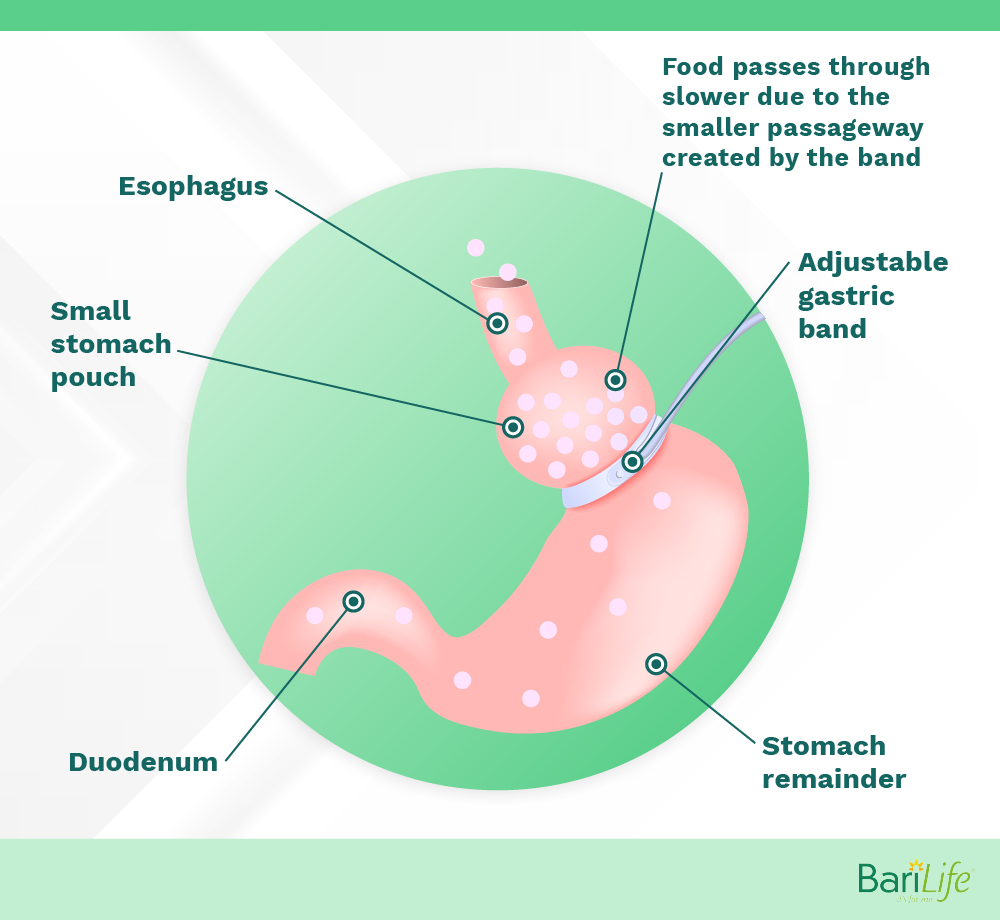
The feeling of fullness one feels will depend on the space between the stomach pouch and the remainder of the stomach. A patient can have the band adjusted to reduce this space by having the doctor fill it with sterile saline, which is done through a port placed under one’s skin. The size of the space between the two pouches of the stomach is made smaller over time with periodic fills of saline.
Advantages of lap-band surgery
Lap-band surgery can help a person lose about 40 to 50-percent of excess weight loss with no cutting or rerouting of intestines. By reducing the size of the stomach pouch, it can help reduce overall food and beverage intake, which over time can help promote weight loss.
This type of weight loss surgery is ideal for those people who do not want to undergo a long hospital stay or recovery period. Most people who undergo lap-band surgery only stay in the hospital for about 24 hours or less. And this surgery is reversible, so there are no permanent changes in the structure or function of the digestive tract. Because of this, lap-band surgery has the lowest risk of vitamin and mineral deficiencies of all the weight surgeries available.
And if you feel like the band is not producing preferred results, then your surgeon can make adjustments to your band with simple saline injections in your port. Your doctor can make these adjustments on an outpatient basis that require no downtime afterward.
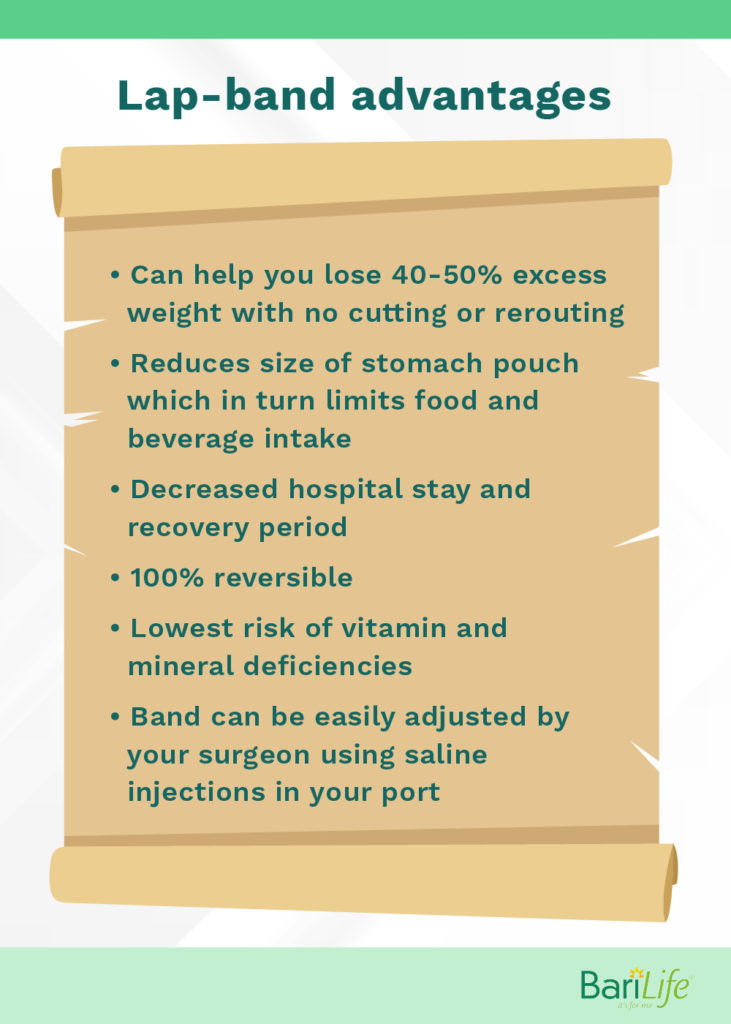
Disadvantages of lap-band surgery
However, because of this reversible weight loss surgery method, it has a lower early weight loss rate, requires a foreign body to be within the body, and has the highest rate of reoperation. Also, complications can occur in lap-band patients such as band erosion that can lead to long-term port infection in most cases.
Also, as a result of restriction from the gastric band, food can become stuck in the esophagus, which over time, could lead to esophageal dilation. The esophagus is a muscular tube that connects the throat with the stomach. When there is enlarging of the esophagus, which typically can occur about 5 to 7 years after lap-band placement, then it loses its function of pushing food down into the stomach. This can lead to difficulty swallowing, vomiting, or acid reflux. The risk of esophageal dilation can increase with overeating.
Another notable complication of lap-band surgery is lap-band slippage, which can lead to serious complications if not treated. Keep reading for more information on lap-band slippage.
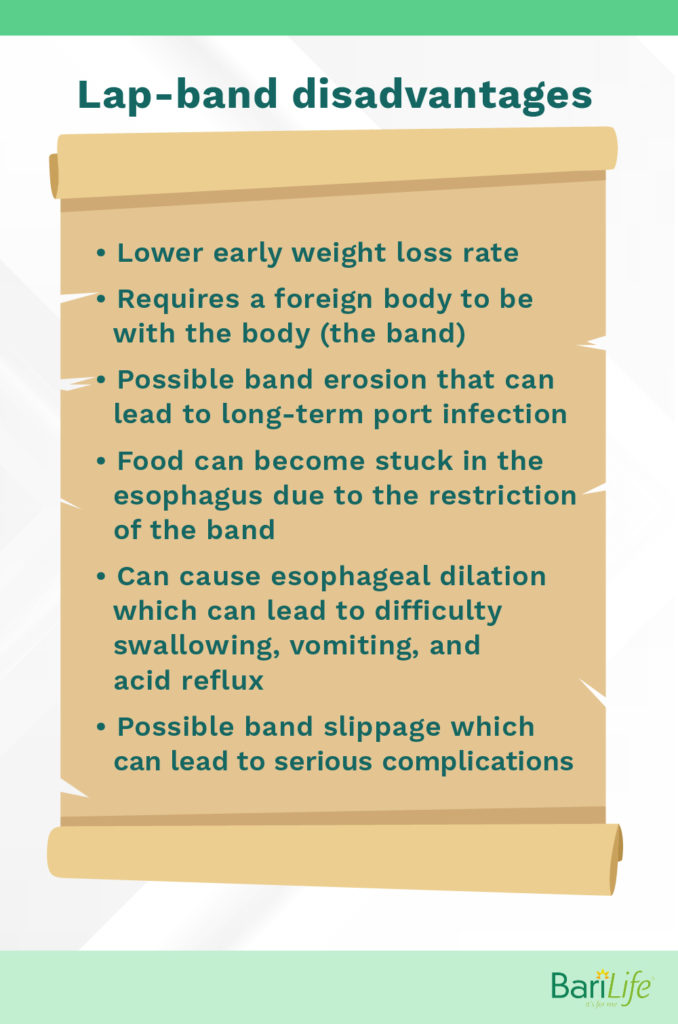
About lap-band slippage
When the lap-band slips out of place, usually downward onto the stomach, serious complications can occur as a result of the herniation of the stomach. Research shows that about 4-13-percent of lap-band surgery patients experience lap-band slippage.
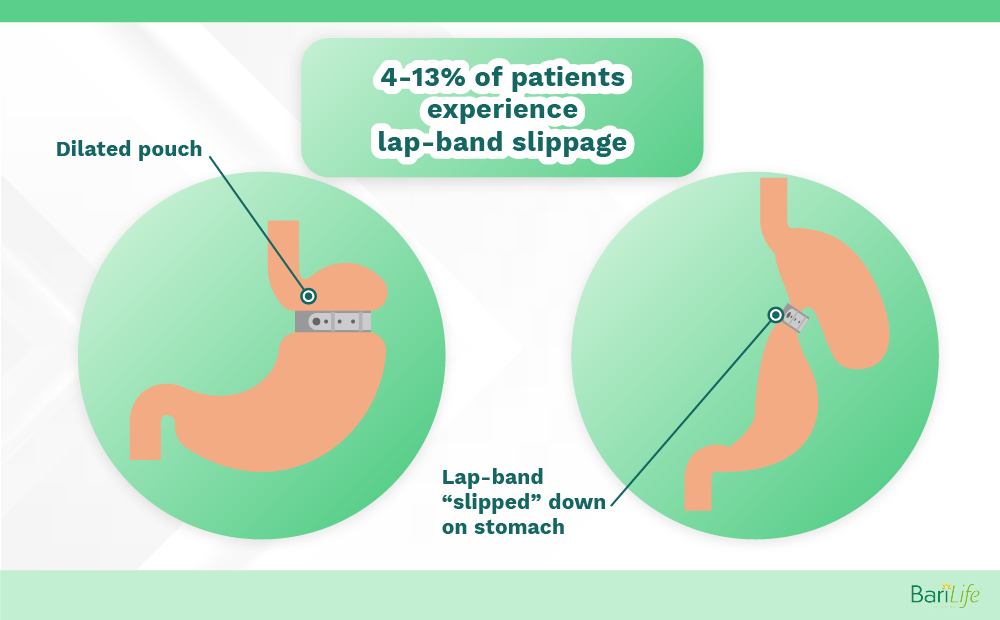
Possible causes of lap-band slippage include overeating, vomiting, drinking or eating too quickly or consuming carbonated beverages, or surgical technique of placing the lap-band too low on the stomach during surgery. Lap-band slippage requires fluid removal from the lap-band, lap-band repositioning, or lap-band removal for treatment of related symptoms.
If left untreated, lap-band slippage can cause serious symptoms. Repositioning of the lap-band may help reduce the slip risk, most people end up having a recurrence which requires removal of the lap-band.
Signs your lap-band may have slipped
If you’re not sure if you are experiencing lap-band slippage, ask yourself if you’re having any of the following symptoms:
- Severe pain
- Nausea
- Vomiting
- Acid reflux
- Chest pain
- Abdominal pain
- Food intolerance
- Dysphagia, or trouble swallowing
- Early satiety
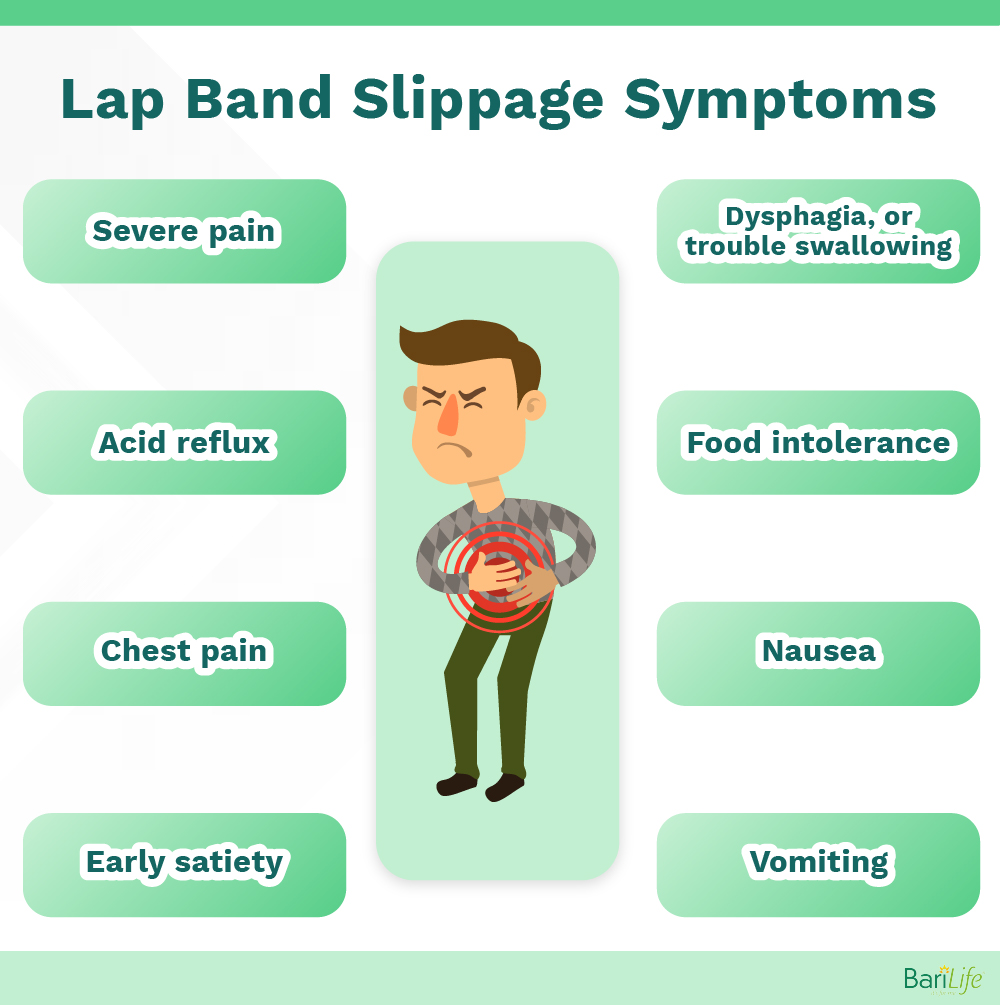
Serious complications of lap-band slippage, if left untreated, include gastric perforation, ischemia, necrosis, and prolapse. That is why it’s important that as soon as you recognize symptoms, that you seek help so you can check for any possible complications.
What to do if your lap-band slips
If you experience any of the above symptoms, be sure to contact your surgical team immediately. And if they are unavailable when such symptoms occur, then make sure to visit your closest emergency room for treatment. It will be necessary to undergo imaging such as anterior-posterior abdominal radiograph films and an upper GI series to diagnose lap-band slippage and expedite treatment.
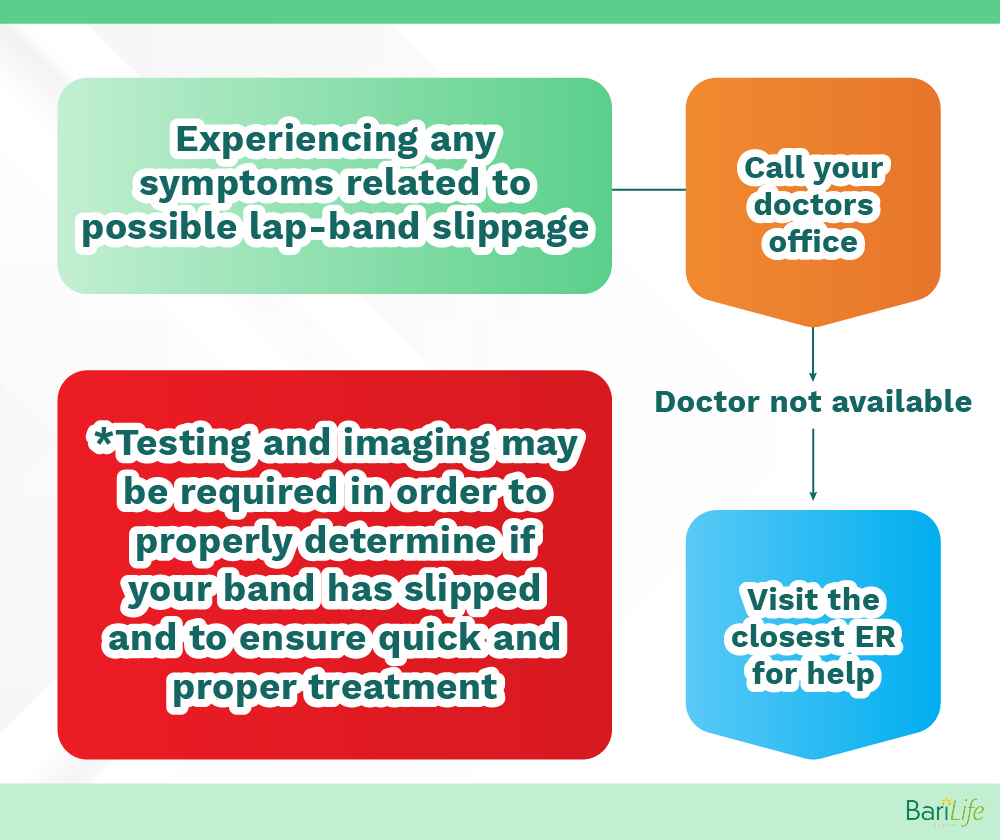
It may be helpful to have copies of your medical records available in a binder or folder ahead of time in case you have to visit a medical facility that is not familiar with your case. This way you can avoid any delay of treatment that could increase your risk of serious complications of lap-band slippage.
When you receive lap-band surgery, it’s important to be aware of the risks of lap-band slippage and other complications ahead of time. This is because if symptoms are left untreated, it can lead to serious harm to your digestive tract that can have long-term impacts on your overall health.
If you have any questions about symptoms of lap-band slippage or have any concerns about your current or pending lap-band surgery, don’t hesitate to contact your surgical team for information or support.


If there’s been a slippage & I had saline removed but the day after I started getting chest pains. Is that an urgent sign or can I wait a couple of days, I am able to drink water & eat, but it’s towards evening c hest & upper back start to really hurt.